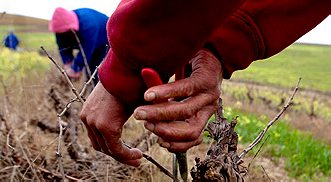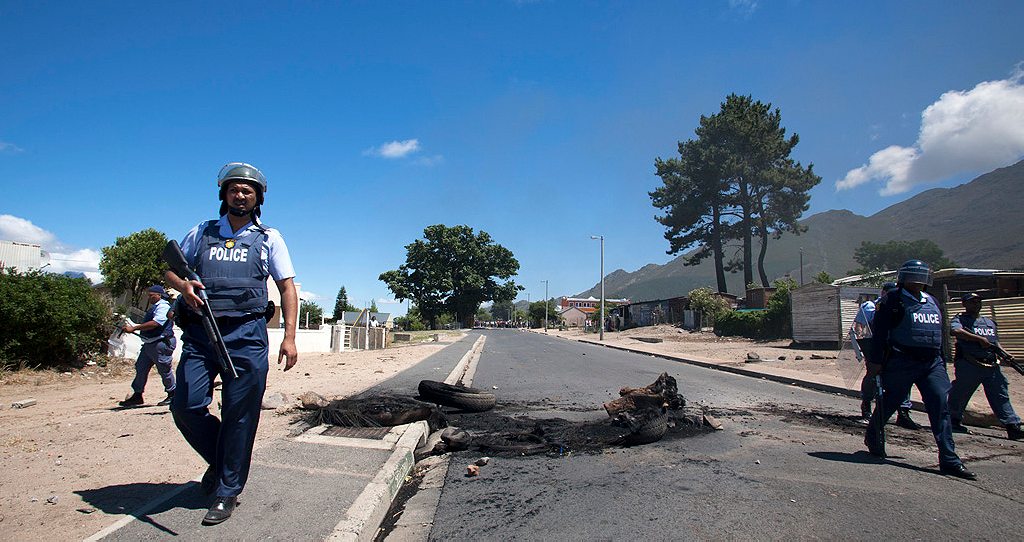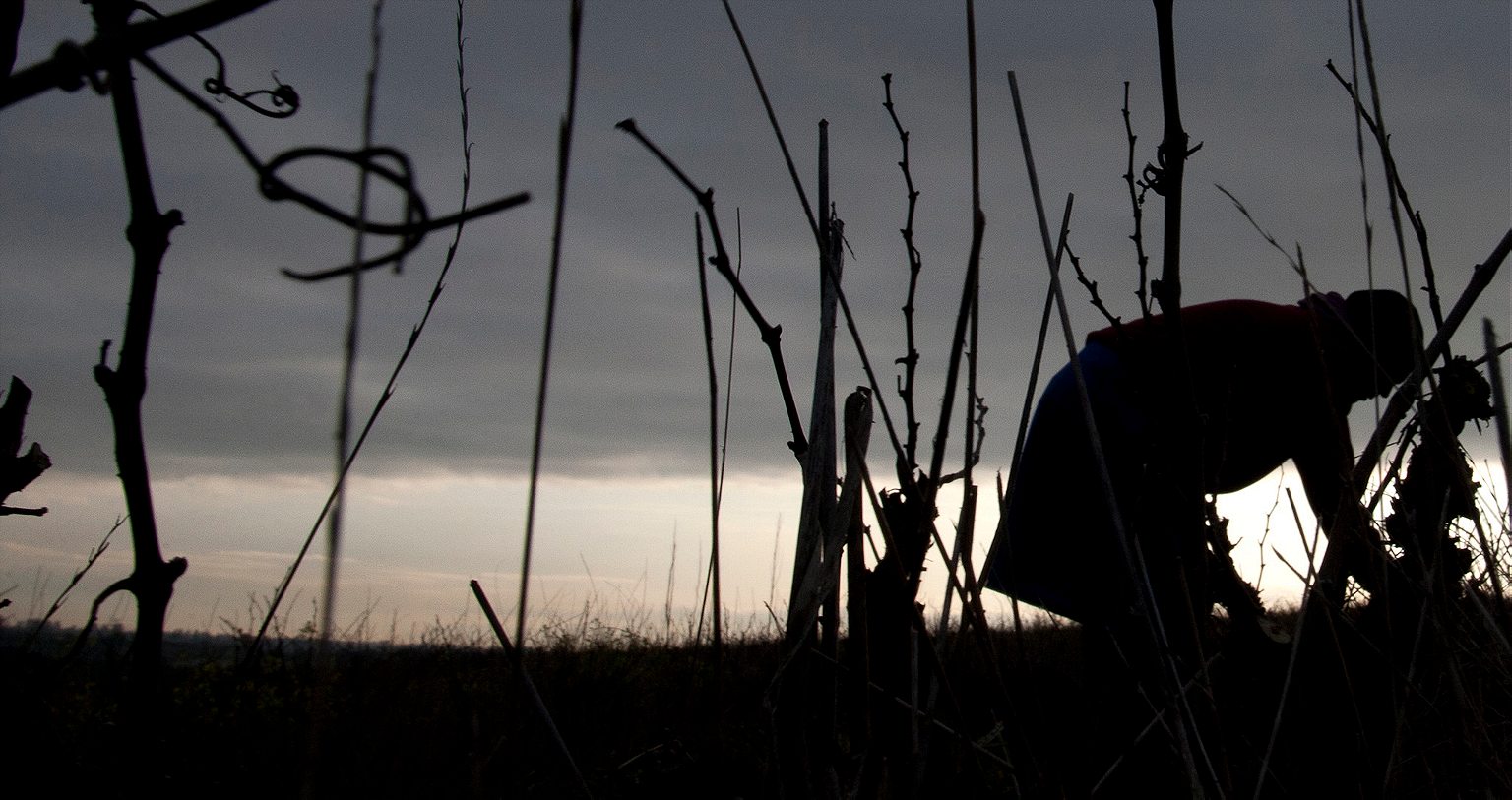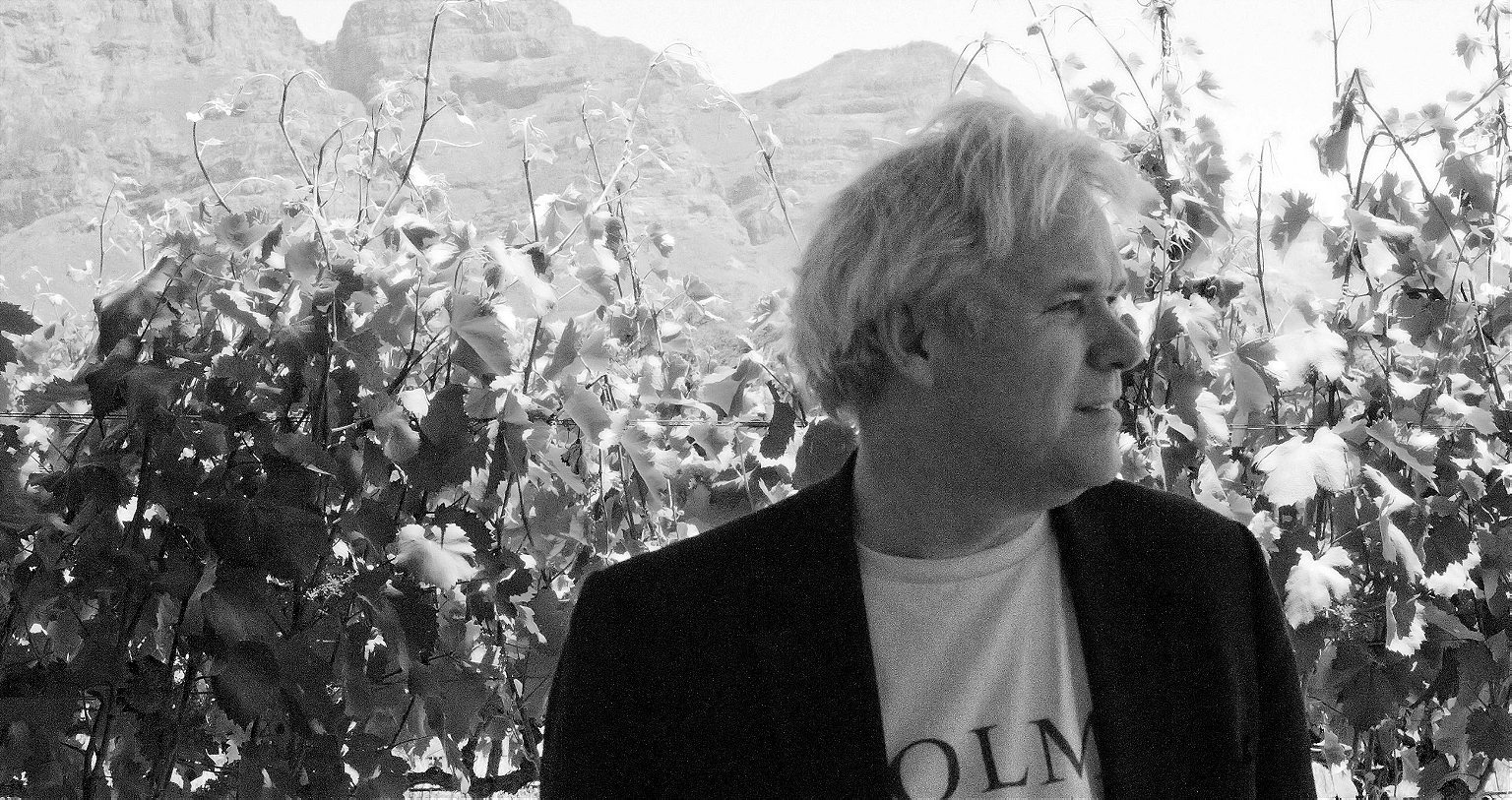These are tense times in South Africa’s wine country, but one farmer is facing the industry’s troubled past head-on.
When Mark Solms decided to turn his family’s land in Franschhoek into a serious wine estate, he took an unusual approach to his oenological endeavors: he hired an archeologist and a historian and began to excavate his property.
“We set about, literally and figuratively, digging up the past,” says Solms, who is a sixth-generation landowner in this vine-carpeted valley, just an hour from Cape Town. For years he and his team went about retracing the complex history of the 30-hectare plot of land, sifting for clues that would help him better understand the lives of his workers and their slave ancestors. Eventually they came across the remains of a 7,000-year-old civilization, not more than 50 meters from Solms’ bedroom.
“One of the farm workers, who hardly ever looked me in the eye before, took a stone tool from the site and said: ‘You see, professor, my people were here before yours. How come I work for you?’ If it wasn’t said, it was implied.”
Solms is a serious man—tall, flushed in the cheeks, with a mad-professor shock of gray hair and an amorphous accent that suggests a man who has seen his share of this world. Solms’ primary interest isn’t wine; it’s the human brain. A neuropsychology professor at the University of Cape Town and director of the Arnold Pfeffer Center for Neuro-Psychoanalysis in New York, he has dedicated his career to investigating the relationship between the brain and personality. He’s made landmark discoveries about brain activity in the dream world; he has translated sprawling volumes of Freud’s work; he uses phrases like “insoluble morass” as casually and convincingly as one might say “raging hangover”.
It seems fitting that a man invested in these heady academic pursuits would choose to grapple with the demons of the wine industry’s past. The winery’s Van de Caab Museum, filled with the fruits of the excavations, tells the stories of the workers who have tilled the land at Solms-Delta over the centuries: of Candaza van de Caap, who was assaulted and abused by both master and mistress; of Philida van de Kaap, who gave birth to four children fathered by the master’s son, who denied his involvement and saw to it that Philida was sold for her insolence; and of the current farm workers, who share the intimate details of working the land under the pressures of apartheid.
But the museum was just the beginning. The bigger question, says Solms, was what to do about the land.
“I was scared. You have to be a bloody idiot to not recognize that you’re in danger if you hold on to these ill-gotten gains. Somebody’s going to come and take it back eventually. Think about the spate of farm murders—not just simple murders and robberies. If you look at the details of those crimes, you can see there is rage behind them.”
Along with fear came, inevitably, guilt. “I’m obviously not the only one. The ownership of the economy is built on theft, if not murder. In the deep recesses of our minds, we know this is not right.”
Considering the weight of these emotions, the obvious question, then, is why not just give the land back? “You have all kinds of rationalizations come flooding into your brain, like ‘it’s not me who took the land. It’s not the farm workers now who were dispossessed of it. That was 350 years ago.’ Ultimately I kept it out of greed and self-interest. My children are the seventh generation and I want to give them this.”
What Solms did instead was organize a loan, with his land as collateral, that allowed the 180 workers on his farm to buy 30 hectares connected to Solms’ land. Solms, along with his neighbor Richard Astor, joined forces with the farm workers, each a one-third partner in the Solms-Delta wine venture. Seven years later, locals from Cape Town and tourists from around the world can visit the vineyard and sip their way through Solms-Delta wines grown, crushed and crafted by disadvantaged workers while reading about the lives of their slave ancestors who planted the first vines.
Solms says he can’t imagine making wine any other way. “You can’t take on the ownership of such a property and not also take on its history.”

The history of South Africa’s wine industry is much like the history of South Africa itself: a long, complex tale of oppression and struggle, hope and disappointment. Jan van Riebeeck, Dutch East India Company commander and the so-called founder of Cape Town, planted the first vines on the Western Cape in 1659. His crude product was meant mostly for sailors staving off scurvy on the arduous route around the Cape back to Europe, but two decades later, his successor, Simon van der Stel, recruited French winemakers to join the new African settlement and that’s when things got serious. Soon, van der Stel and his team of European noses were producing renowned Chenin blanc on the slopes of Table Mountain.
The Cape’s wine industry continued to grow and attract attention from European elite; Napoleon purportedly requested cases of South African wine for his island exile. As production increased, so did the need for able-bodied workers, which came in the form of black and so-called colored slaves (colored being the catch-all South African term for descendants of everyone from the lighter-skinned native peoples of the Cape to slaves imported from southeast Asia). After slavery was abolished in 1834, worker pay often came in the form of wine, in what is called the dop system (from the Afrikaner word for alcoholic drink) that created a host of alcohol-related issues in the wine valleys: malnutrition, violence, rampant TB, and one of the world’s highest rates of fetal alcohol syndrome. Though officially banned in 1990, the wine-for-work policies still haunt the region to this day.
After achieving a measure of global success during the 18th and 19th centuries, the industry withered for much of the 20th, as the tolls of apartheid isolated the country and tarnished its image with wine drinkers worldwide. Sipping Shiraz was seen as supporting oppression; subsequent boycotts from western countries crippled its export business. The end of apartheid came with a resurgence in the wine industry, and soon wine shops and restaurants around the world were serving up affordable bottles of South African Pinotage and Chenin blanc. Today, South African producers do $3 billion in sales a year, making it the eighth largest wine industry in the world.
But the last year has not been kind to the Western Cape, where most of the country’s wine is produced. Last summer, the Human Rights Watch issued a 96-page report detailing the problems that continue to plague some farms in the region, including low wages, poor housing, and lack of real safety standards. “The wealth and well-being these workers produce shouldn’t be rooted in human misery,” said Daniel Bekele, HRW’s Africa director.
In early November of this year, tensions over working conditions reached a boiling point as farm workers went on strike and took to the streets to demand better wages. Vines were burned, highways blockaded, and lives lost as the Western Cape’s massive agricultural economy ground to a halt. For now, neither side appears ready to back down. Unions demanding a minimum wage increase from $8 to $17 a day claim that “fruit will die on the vine” if their demands are not met by January 9th. In the meantime, major wineries have brought in private security teams—heavily armed, patrolling properties on ATVs—to protect the crops.

The key to the success of South African wine around the world over the years has been based in large part on value, the fact that a $10 bottle of Shiraz to all but the most discerning of palates might taste as good and complex as a $25 Napa cabernet, say, or a $40 Bordeaux blend. Of course, competing on value creates a conundrum for an industry trying to move beyond its troubled past.
“The same guy who reads the paper and says that South Africans are a bunch of racists is the same guy who is happy to pay 3€ for two bottles and get the third one free,” says Eben Sadie, head of Sadie Family vineyards. Sadie is something of a cult winemaker, a guy who takes high-quality grapes farmed on different parcels of land and turns them into magical potions that serious drinkers and collectors from around the world snatch up as soon as they come on sale. He speaks passionately and philosophically about environmental preservation and the impact of ego on wine, but when it comes to the question of worker pay, it all boils down to math: the numbers just don’t add up—not for the worker, but not for the farmer either.
“If you sell a 29 rand bottle [just north of $3], the government makes R5.10, the supermarket makes a killing, and the property makes 36 cents. With that money the grower has to maintain his equipment, replant, improve and try to go forward. There are no subsidies of any nature. While the small farmers themselves are barely hanging in, the supermarkets are negotiating for more productivity and lower prices.”
But in Sadie’s philosophy, one he shares with a group of like-minded winemakers from the Swartland region, lies a potential way forward for the small farmer who cares about quality, profits and working conditions. Sadie, like the great winemakers of the Old World, is a deep believer in the notion of terroir, that everything—from the alkalinity of the soil to the mood of the worker who picks the grapes—can be detected in the final product. He pays his workers more because he’s only interested in making the best wine possible (“honest” or “soft-spoken” is how he describes the wine), and the prices he fetches for his product allow him to keep his employees happy as well as contribute to various community projects—a virtuous cycle, of sorts.
Despite his efforts to improve conditions in the Swartland, Sadie doesn’t see the farmers as the central problem of the unshakeable troubles in the industry. In his mind, the real culprits are the government, the supermarkets, and the international drinker. “The monster is a much bigger monster and he sits in an air conditioned office on the other side of the world and he reads the paper and he says ‘How dare they!’”
The basic question at the heart of all of this—from the worker strike to Sadie’s exacting methods to Solms’ personal dilemma—is what constitutes fair? For a farmer scraping to make a living off his wines in a crowded market, fair might be a few more rand than the legal minimum wage. For those who can afford it, fair might mean better housing and access to education and health care. And for those who pick grapes because that is what their fathers did, fair died three centuries ago when their ancestors picked grapes because they had no other choice. Everything since then has just been a different shade of unfair.
The only matter that everyone seems to agree on is the enormous complexity of these issues, the Pandora’s box of social, political and historical challenges that is thrown open simply by trying to address a matter as seemingly black and white as minimum wage.
“There’s a very real danger of South African wine being seen the same way it was during apartheid,” says Solms. Wine, after all, is one of South Africa’s most valuable cultural exports, an entry point for people living thousands of miles away with little understanding of life on the ground. “The industry is an exemplar of the problems we have in this country. We may have a beautiful constitution, but life has not really changed. And those are the chickens that are coming home to roost. ”

The inside of the Snyman family’s home is not that much different from a home you might find in the Cape Town suburbs: family photos are perched on book shelves, pots bubble away on a four-burner range, a woman’s rugby game is on the satellite television.
Magrieta and Jacobus Snyman have been farm workers on the Delta farm for 20 years, a decade before Mark Solms took up ownership. They have the rough skin and distant gaze of a couple that has spent too many days under the African sun. They speak slowly, staring only at each other, measuring what has no doubt been a challenging life against the hope of recent changes. “The conditions are good and some small farms in the area see us as a model,” says Jakobus. “But there’s still progress to be made.”
While wages may be at the heart of the current strikes, living conditions are every bit as fundamental for farm workers. Most farm owners provide some kind of housing, but usually that means makeshift homes, crudely converted from stables or stitched together with plywood and scrap metal. The Snymans may only earn about $15 a day (not enough, as the Snyman’s are quick to point out, “to start any real savings”), but most of their living expenses are picked up by the winery.
Through the Wijn de Caab Trust established in the workers’ names, Solms-Delta provides comfortable housing, health and dental benefits, plus Internet access, a full-time social worker and an afterschool teacher to help kids with their homework. One of Solms-Delta’s most successful ventures beyond the vines has been their music program: There are four bands on the farm, including an 80-person marching band. “A friend of mine likes to joke,” says Solms, “that we don’t only farm wine, we farm music.”
The single biggest allocation from the workers’ trust has gone towards improving education. The Snyman’s living room bear witness to the investment: report cards and spelling quizzes are taped to the walls with teacher smiley faces and exclamation points. “It’s nice to know that our kids will have better opportunities than we had,” says Magrieta.
When I ask Solms if he worries that his example might breed resentment from neighbor farmers, especially during such tense times, he admits he hasn’t always been the most popular guy in Franschhoek. First they thought he was a fool; then, as his model began to show promise, came the death threats. “In the present climate, many farmers find my point of view treasonous.”

But as Solms himself is quick to point out, he is by no means alone in his mission to even the playing field in the wine world. In 1995, Dr Paul Cluver, one of South Africa’s best winemakers, donated a 100-hectare plot on his sprawling wine farm to local workers. Seventeen years later, Thandi is the first fully black-owned wine producer in South Africa, a collective of 250 families putting out award-winning chardonnays and sauvignon blancs. The Fair Valley Association, with the support of Fairview, one of South Africa’s oldest wineries, has been making immensely popular wine since 1997, most of which is exported to the US, Japan and the UK. Biggest of all, Tukulu, a joint venture between black entrepreneurs, a collective of farm workers, and Distell, South Africa’s largest wine and spirits producer, represents one of the most promising paths to change, with everyone bringing something to the table and everyone taking something away.
The common thread connecting these wineries—any many others making the effort to affect change in the industry—isn’t simply to improve worker pay and benefits, but to actually involve disadvantaged workers at all levels of production and give them equity for their work. “Our fates are inextricably linked to each other,” says Solms. “We must recognize our mutual needs and find a way they can be met, because they most certainly can.”
Post-apartheid Africa, after all, is a country that demands big ideas, but the bigger the idea, the more potential for corruption, bureaucracy and dissent to derail it. Government money earmarked for improving the state of disadvantaged wine workers has been chewed up by administrative missteps and ill-advised endowments. The Black Economic Empowerment movement, a government-backed effort to increase black ownership in the agricultural sector, has been marred by controversy and alleged corruption. And the Wine Industry Ethical Trade Association (WIETA), set up to improve working standards on farms across the country, seems uniquely capable of breeding frustration from all sides of the industry: empowerment advocates claim WIETA doesn’t go far enough in setting up ethical standards, while farmers accuse boards members of sewing the seeds of unrest and violence during the recent wave of protests.
If all of this sounds complicated, well, it is. In a country like this, the big picture idea, no matter how noble and pure of heart, is bound to open up wounds and breed controversy and resentment that repeats itself on smaller and smaller scales, a Russian nesting doll of South African angst and frustration.
That’s where guys like Solms come into play. His efforts required no government interjection, no certification from outside organizations. “There is something to be said for thinking small in South Africa,” says Solms. “The kinds of problems that need to be tackled in this country are internal things—attitudes, relationships.”
The wage war may be the focus in the Western Cape right now, but a few extra dollars a day won’t balance out an industry that has just 1 percent black ownership in a country where blacks make up 80 percent of the population. It will take a robust mixture of profit sharing, financial backing of black and so-called colored land ownership, and farm-supported education and social initiatives before the industry begins to better reflect the country it represents.
A long journey, according to Solms, but not an impossible one. “As we learned with Mandela, miracles sometimes happen.”